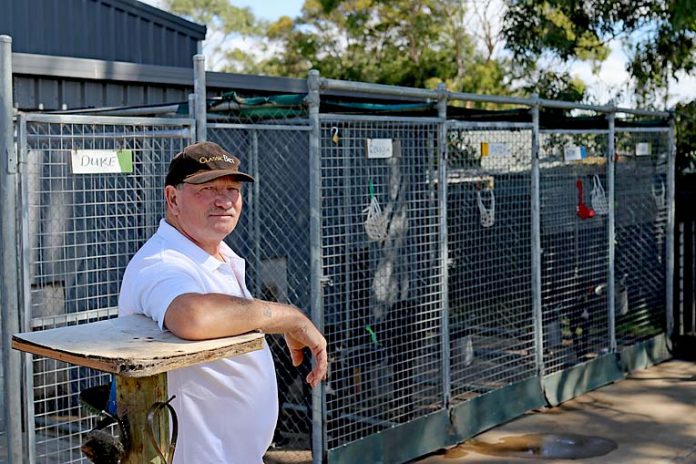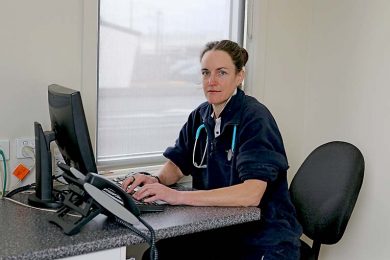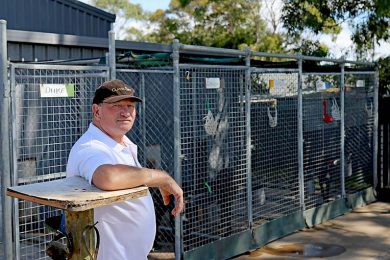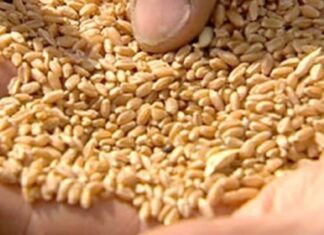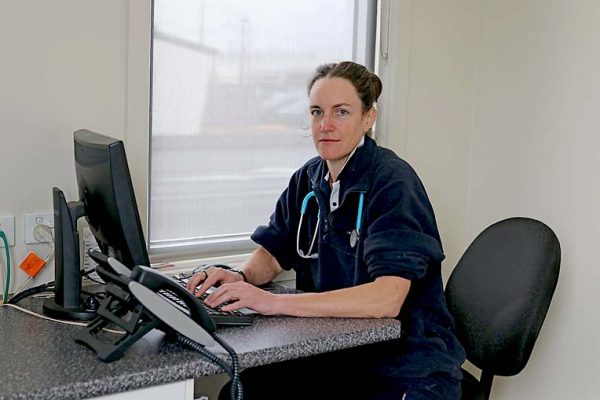
A CORONAVIRUS – not linked to COVID-19 – is currently affecting the Limestone Coast’s canine community, with cases of the deadly parvovirus also reported across the region in recent weeks.
Gambier Vets owner and senior vet surgeon Rebel Skirving revealed the highly-contagious coronavirus had spread across dogs in the region, but was completely unrelated to the global pandemic.
“Coronavirus in dogs is something which has been around for years, but by coincidence, we have seen a wave of canine coronavirus during this COVID-19 outbreak,” she said.
“The virus in dogs is not usually fatal, but it can cause vomiting and diarrhoea and dogs can be unwell for up to three to four days.
“They can be tired, quiet, but most are usually good with rest and supportive therapy. A lot do not need to be treated in hospital.”
Ms Skirving said there had been numerous cases of coronavirus at the clinic, with some reported in racing greyhounds and domestic pets.
“There are a lot of others which we suspect might have it, but have not been tested due to financial reasons for the owner or the dog has already shown signs of improvement,” she said.
“One of the bigger concerns with canine coronavirus is that it is quite contagious among other dogs.
“They can quite easily spread it to other dogs in close contact.”
In the past month, Ms Skirving said reports had increased across the country of the canine coronavirus affecting the greyhound racing industry.
“These dogs are high-level athletes which compete regularly and are often checked by vets,” she said.
“They also do a lot of travelling, so they visit race tracks where there can be lots of dogs together.
“It is unfortunately a good scenario to spread the virus, which is quite contagious.”
Ms Skirving said cases of both parvovirus and coronavirus were currently being treated in the region.
“The parvovirus is much more severe and is very debilitating to the point where they can vomit up blood and have bloody diarrhoea and it is very contagious,” she said.
“Parvovirus is always a worry, but I would like to think most dogs are already vaccinated against it… it is one of the vaccines included in plans at most clinics.
“If pets are vaccinated, it is very low risk they would pick up parvovirus.”
GREYHOUND INDUSTRY IMPACTED
Mount Gambier Greyhound Racing Club president Noel Perry said the racing industry had been severely impacted by the canine coronavirus.
While racing can occur with significant race-day restrictions due to the COVID-19 pandemic, including no crowds and on-course catering, the canine virus is impacting the availability of racing dogs.
“One of our bigger kennels in Mount Gambier has had it, as well as a few of our smaller ones which has really affected our nominations for meetings,” Mr Perry said.
“I have just got it now and once you get it in the kennel you can not race.”
Mr Perry said as some dogs were unable to be isolated, it was a waiting game as to when another was going to fall ill.
“I only have five dogs, but if you are a trainer with 40 dogs, it can impact you pretty bad,” he said.
“You can imagine if you wait for the first one to fall ill until the last, it could go on forever.
“It is a little bit worrying, a lot of people will probably be out of work.”
Believed to be among an estimated six Limestone Coast trainers affected, Mr Perry said he had never seen an outbreak to this scale during his 12 years of involvement.
“Because dogs race all over the place, it has now finally got around to us and we have been affected badly,” he said.
“The first dog that caught it usually barks at tea time and breakfast, but I noticed he was not barking so I knew there was something wrong.
“A lot of trainers have pulled out and whether it is because of the bug or are just a little bit frightened to come and get it.”
Spending around $200 a week feeding his dogs, Mr Perry said the virus would inevitably start chewing away at finances for all trainers.
“People say you race for prizemoney, but a lot of the prizemoney actually goes to feeding the dogs,” he said.
“If they are not racing, then it has to come out of your pocket and if you had 40 dogs then it would be a mean feat.”
Mr Perry said he was worried for the future of the greyhound racing industry with border restrictions causing trouble for nomination numbers.
“We rely heavily on greyhounds coming from Victoria so the human coronavirus has impacted everything,” he said.
“We will not be able to get the nominations we need just from South Australia.”
ADVICE FOR PET-OWNERS
Ms Skirving advised pet owners to stay safe and if dogs experience symptoms, to not visit public areas when possible.
“If there are multiple dogs in one household and one starts vomiting, we recommend to try and keep them separate if possible,” she said.
“Do not take the sick dog out in public areas, please do not go to the dog parks and common places of gathering for dog walking.
“If your dog is healthy, then bringing it out into the public is probably an unnecessary risk.”
Ms Skirving said if pet-owners were concerned a good place to start would be giving their vet clinic a phone call.
“If there is genuine concern and significant issues with the dog, then people can make arrangements to book an appointment with the vet,” she said.
“For dog owners, we advise they make sure all vaccinations are up to date and both the canine coronavirus and parvovirus have a vaccine available.
“Both viruses are treatable through supportive therapy which can include keeping them hydrated, making sure their pain is under control and avoiding secondary infections.”
Gambier Vets will alter its opening hours as of this week and will open Monday to Friday from 8am till 6pm.
The clinic will no longer open late on Thursday evenings or Saturday mornings.
Ms Skirving said vets were still on call for any emergency requirements.

